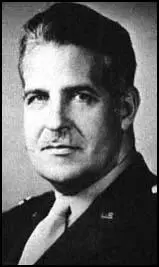Leslie Groves (original) (raw)

Leslie Groves, the son of a Presbyterian minister, was born in Albany in the United States on 17th August, 1896. He attended the University of Washington and the Massachusetts Institute of Technology before graduating from West Point Military Academy in 1918.
He served in the construction division of the QMG and by the Second World War had reached the rank of colonel. In 1942 he was promoted to brigadier general and placed in charge of the Manhattan Project.
Groves arranged the purchase of uranium and selected the Los Alamos site. He also recruited Robert Oppenheimer (USA), David Bohm (USA), Leo Szilard (Hungary), Eugene Wigner (Hungary), Rudolf Peierls (Germany), Otto Frisch (Germany), Felix Bloch (Switzerland), Niels Bohr (Denmark), James Franck (Germany), James Chadwick (Britain), Emilio Segre (Italy), Enrico Fermi (Italy), Klaus Fuchs (Germany) and Edward Teller (Hungary) to the project.
By the time the atom bomb was ready to be used Germany had surrendered. Leo Szilard and James Franck circulated a petition among the scientists opposing the use of the bomb on moral grounds. However, Groves strongly disagreed with this view and advised Harry S. Truman, the USA's new president, to use the bomb on Japan.
On 6th August 1945, a B29 bomber dropped an atom bomb on Hiroshima. It has been estimated that over the years around 200,000 people have died as a result of this bomb being dropped. Japan did not surrender immediately and a second bomb was dropped on Nagasaki three days later. On 10th August the Japanese surrendered.
Groves was promoted to lieutenant general on 24th January, 1948. Soon afterwards he retired and became vice president of Remington Rand. He published his memoirs, Now It Can Be Told, in 1962. Leslie Groves died in Washington on 13th July, 1970.
Primary Sources
(1) Press statement issued by Leslie Groves after the first atom bomb was tested on 15th July, 1945.
A remotely located ammunition magazine containing a considerable amount of high explosives and pyrotechnics exploded. There was no loss of life or injury. Weather conditions affecting the content of gas shells exploded by the blast may make it desirable for the Army to evacuate temporarily a few civilians from their homes.
(2) Paul Tibbets was interviewed by Studs Terkel in the Guardian on 6th August 2002.
Studs Terkel: And now you're training. And you're also talking to physicists like Robert Oppenheimer (senior scientist on the Manhattan project).
Paul Tibbets: I think I went to Los Alamos (the Manhattan project HQ) three times, and each time I got to see Dr Oppenheimer working in his own environment. Later, thinking about it, here's a young man, a brilliant person. And he's a chain smoker and he drinks cocktails. And he hates fat men. And General Leslie Groves (the general in charge of the Manhattan project), he's a fat man, and he hates people who smoke and drink. The two of them are the first, original odd couple.
Studs Terkel: They had a feud, Groves and Oppenheimer?
Paul Tibbets: Yeah, but neither one of them showed it. Each one of them had a job to do.
(3) Max Hastings, The Guardian (2nd August, 2005)
The 60th anniversary of the dropping of the first atomic bomb. The occasion will be marked by a torrent of prose from those who regard the destruction of Hiroshima and of Nagasaki three days later as "war crimes", forever attaching shame to those who ordered them.
By contrast, there will be a plethora of dismissive comment from pundits who believe the nuclear assault saved a million allied casualties in 1945, by causing Japan to surrender without an invasion of its mainland.
Plentiful evidence is available to both schools. In the spring of 1945, Americans fighting in the Pacific were awed by the suicidal resistance they encountered. Hundreds of Japanese pilots, thousands of soldiers and civilians, immolated themselves, inflicting heavy US losses, rather than accept the logic of surrender.
It was well-known that the Japanese forces were preparing a similar sacrificial defence of their homeland. Allied planning for an invasion in the autumn of 1945 assumed hundreds of thousands of casualties. Allied soldiers - and prisoners - in the far east were profoundly grateful when the atomic bombs, in their eyes, saved their lives.
On the other side of the argument is the fact that in the summer of 1945 Japan's economy was collapsing. The US submarine blockade had strangled oil and raw-materials supply lines. Air attack had destroyed many factories, and 60% of civilian housing. Some authoritative Washington analysts asserted that Japan's morale was cracking.
Intercepts of Japanese diplomatic cables revealed to Washington that Tokyo was soliciting Stalin's good offices to end the war. The Americans were also aware of the Soviets' imminent intention to invade Japanese-occupied China in overwhelming strength.
In short, the 2005 evidence demonstrates that Japan had no chance of sustaining effective resistance. If America's fleets had merely lingered offshore through autumn 1945, they could have watched the Japanese people, already desperately hungry, starve to death or perish beneath conventional bombing. Oddly enough, Soviet entry into the war on August 8 was more influential than the atomic explosions in convincing Japanese leaders that they must quit.